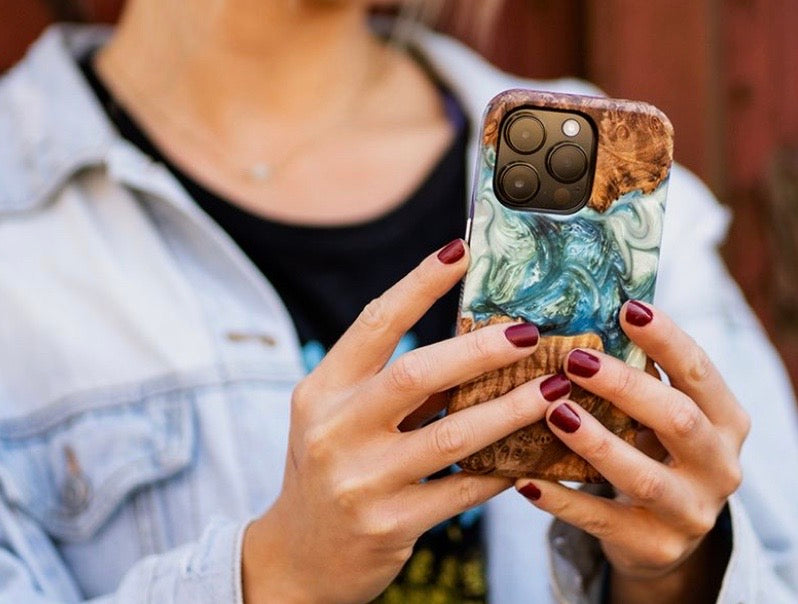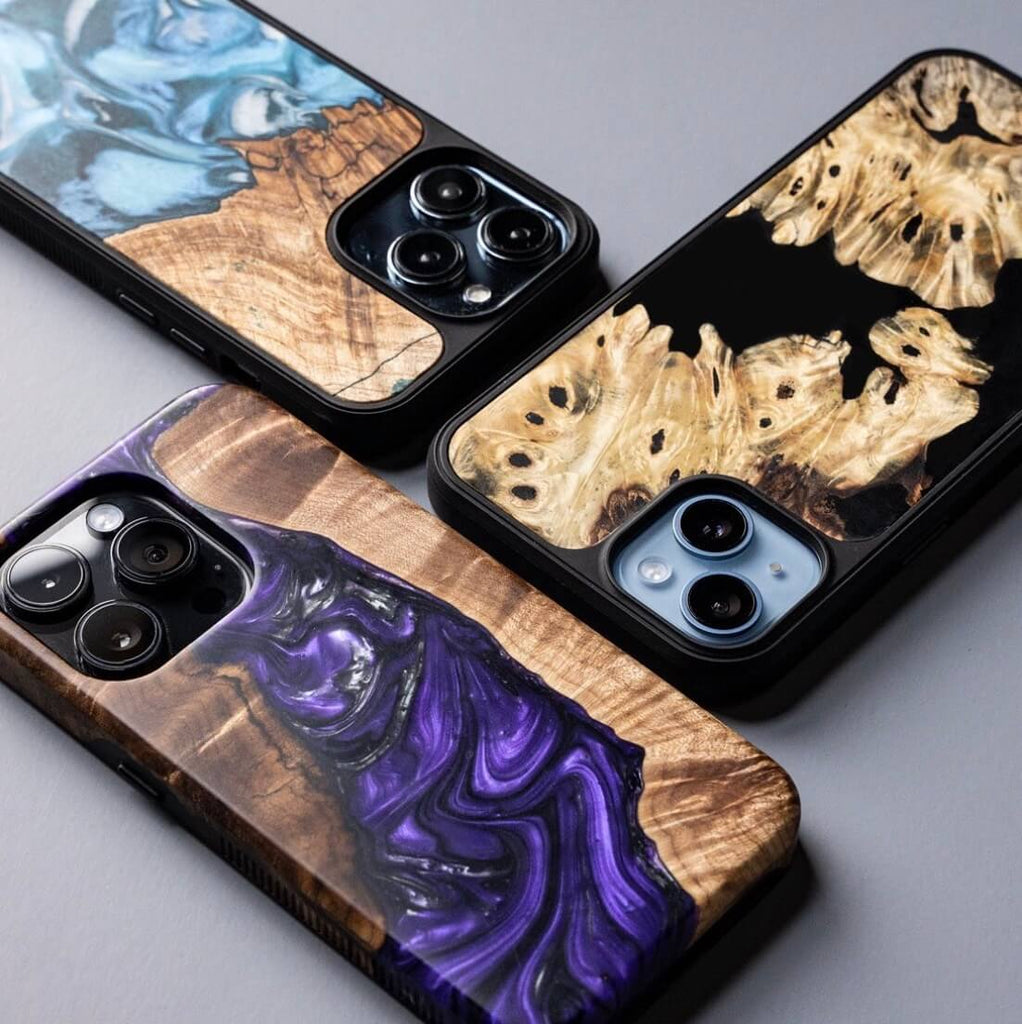
Apple, Samsung, and Google make up 90% of the smartphone market in the United States, so you’re really forced to choose between one of those three. But your new phone also needs a case, and there are millions of options to choose from – this decision is often the more difficult one.
With so many materials, designs, and prices, it can feel overwhelming. That’s why we created this guide to help you determine which case material is best for your phone. We’ll break down the pros & cons of each, their price points, and why each of them should be on your radar. We’ll start with the most common material: plastic.
Plastic
Plastic is the most common material used to make phone cases, primarily because of its low cost, versatility, and durability. Most cases are made from one of three materials, each of which has its own distinct features:
-
Polycarbonate (PC) – The hard, rigid construction of PC cases makes them more impact-resistant than other materials, which is great if drop protection is your top priority.
-
Thermoplastic polyurethane (TPU) – These types of cases are softer & more flexible than PC cases, but not quite as soft as silicone.
-
Acrylic – Though less common than their plastic counterparts, acrylic cases stand out for their crystal clear appearance. You can show off your naked phone with a thin layer of protection; but beware, these cases tend to yellow over time.
Despite being the most popular phone case material, plastic has some drawbacks, especially compared to wood. Let’s take a look at what people love & hate about their plastic cases:
Advantages:
- Generally more affordable than other materials
- Decent protection against regular wear & tear, and a handful of drops
- Lightweight
- More styles & designs available because of the low cost and ease of customization
Disadvantages:
- Adequate protection compared to other materials like wood & metal
- Plastic retains heat, which can worsen your phone’s overheating problem
- Shorter lifespan than higher-quality case materials
- Bad for the environment
Wooden
Wood phone cases are a unique and eco-friendly alternative to conventional case materials. Because every wood grain pattern is unique, no two cases are alike, meaning they stand out in a sea of plastic & rubber cases.
At Carved, we create wooden phone cases from wooden burls, rather than the trees themselves. This process is more unique & sustainable than traditional wood cases, and allows us to create beautiful designs from Maple, Oak, Willow, Elm, and Buckeye burls.

Protection and style are two of the most important factors when deciding on a phone case; wooden cases excel in both categories. They’re also lightweight, durable, and capable of withstanding drops and scratches, making them ideal for outdoor enthusiasts.
Advantages:
- Aesthetic designs that are one-of-a-kind
- More sustainable than plastic & rubber materials
- Wood mitigates heat, meaning it won’t contribute to overheating issues
Disadvantages:
- Slightly heavier than plastic
- More expensive
- Require routine care
Metal
Metal is a material that’s burst onto the everyday carry (EDC) scene in the last few years. From phone cases to minimalist metal wallets, it’s a high-end material that looks good, feels great, and offers ample protection. The most common materials are aluminum & stainless steel, though they’re usually paired with rubber for extra shock absorption.
But these sleek designs aren’t without their drawbacks, here’s what people are saying:
Advantages:
- Luxurious design
- Increased protection against falls and impacts
- Effectively dissipate heat, meaning they won’t cause your phone to overheat
Disadvantages:
- More expensive than wood, plastic, and rubber
- Heavier than plastic or rubber cases
- May affect signal quality if poorly designed
Leather
Leather cases aren’t as common as other materials, but their stock is rising thanks to their luxurious feel, appearance, and durability. But not all leather cases are made from “real” leather; many of them are made from vegan & faux leathers to save on costs. In fact, vegan leathers are usually made from petroleum-based plastics, which wear down much more quickly than genuine leather.
One distinct advantage of leather phone cases is their functionality. Many of them are designed with a flip cover that doubles as a small wallet, which limits the amount of items you need to carry in your pocket. The flip cover also protects your screen when closed, though most people still opt for a tempered glass screen protector.
Leather cases might be your thing, or maybe not; here’s the short version of what you need to know:
Advantages:
- Luxurious look & feel
- Can develop a unique patina over time (if made with real leather)
- Added functionality with the flip/wallet cases
Disadvantages:
- More expensive option
- Less impact-resistant than other materials
- Susceptible to stains & microtears
Silicone Rubber
Favored for their balance of flexibility, protection, and grip, silicone cases are one of the most popular choices among consumers. Rubber cases that are made from 100% silicone are easy to grip and offer decent protection against minor drops. Silicone also acts as complementing material to plastic, wood, and metal, adding extra grip and shock absorption.
Despite their different compositions, both types of rubber cases are generally lightweight, have a soft-touch feel, and provide a decent level of protection against drops and impacts.
Silicone is a versatile material that smartphone users tend to love or loathe; these are the pros & cons of silicone rubber phone cases:
Advantages:
- Affordable, budget-friendly option
- Added shock absorption to protect against drops and impacts
- Non-slip surface reduces the likelihood of accidental drops
Disadvantages:
- Can lose elasticity, reducing its effectiveness
- Easily attracts lint and dust because of the sticky surface
- Not environmentally-friendly
- Retains heat which can cause your phone to further overheat when outdoors
Factors to Consider When Choosing Your Next Phone Case
Protection and Durability
The primary purpose of a phone case is to protect your smartphone from drops, cracks, and scratches. The most protective materials are wood, polycarbonate (plastic), and metal, all of which reduce the possibility of your phone breaking when accidentally dropped.
Durability refers to the case's longevity and its ability to retain its shape and function over time. A durable case withstands regular use without showing signs of wear such as cracking, stretching, or color fading. Materials like wood, metal, and high-quality plastic often score high on durability, delivering long-lasting protection for your device. And though silicone helps absorb shock, it tends to wear out faster as it stretches with use.
And though it may seem obvious, a case is only protective if it fits your smartphone model. Check out guides on sizing & compatibility for Apple iPhone, Samsung Galaxy, and Google Pixel phones.
Aesthetics and Customization
Beyond protection, phone cases are a way to express your personal style. Rather than your phone look the same as the millions of others that were made, you can cover it with a case that shows off who you are with minimalist designs, vibrant patterns, and more. Because they’re cheap to manufacture, plastic & silicone cases usually have the most color & pattern options. There are also transparent styles available, but they tend to yellow after a few months of use.
Most would argue that metal, leather, and wood are the least customizable materials, and are just too plain for some people. Generally, metal cases are limited to a handful of colors. But leather & wood cases are truly unique, because no two leather patinas or wood grains are exactly the same. And at Carved, we combine colorful resin with wood burls to design truly one-of-a-kind cases, which is why we’ve created over 50,000 unique phone cases.
Another factor to consider is customization & functionality. Do you want your case to simply protect your device, or do you also want it to double as a wallet? Or perhaps you want to add a PopSocket or phone ring to make it easier to hold; these are all considerations you need to have when choosing the right phone case.
Maintenance and Care
Your phone case is supposed to take care of you & your phone, not the other way around. If you find yourself constantly having to clean, oil, or repair your case, it may not be the best option for you. Obviously, it's better to repair or replace a damaged case than a broken phone, but the correct case should still stand the test of time. "There are thousands of cheap cases available on the internet, and in the interest of having to return a low-quality case, you should just invest in a high-quality one in the first place," says Mark of Disputifier.
Plastic and silicone cases generally require minimal maintenance aside from wiping away food crumbs, lint, dust, and other debris. On the other hand, genuine leather cases may require routine cleaning & conditioning to maintain their look & feel. Metal & wood are relatively self-maintaining and scratch-resistant materials, so they’ll also require minimal maintenance.
Environmental Impact
Now more than ever, we’re more conscious about how our purchases affect the planet. Phone cases are no different – each material impacts the environment differently.
Plastic and silicone cases, although affordable and versatile, are made from petroleum, one of the leading contributors to climate change. These materials also take thousands of years to break down, so if they’re not properly recycled, they may end up in a landfill or another polluted area.
Once produced, metal can be recycled multiple times without losing its quality. However, it’s incredibly resource-intensive to extract & process the first time around, which often negates its longevity. Similarly, leather lasts a long time when properly cared for, but the livestock industry is another major contributor to climate change & animal rights issues, which is difficult to overlook.
Wooden phone cases are generally a more eco-friendly material, as long as they’re sourced sustainably. Carved cases are made from wooden burls, which are growths that form from un-sprouted tissue. The lumber industry considers these waste; we don’t. That’s why we source ours directly from the people who harvest & collect them in the Pacific Northwest and Indiana.
The “best” phone case material will vary from person to person. Is protection your top priority, or are aesthetics and functionality more important to you? The good news is that there are plenty of options that are protective, affordable, colorful, and multi-functional. So whether you’re shopping for a new iPhone case, a Samsung Galaxy case, or another popular model, you can choose a case that’s made just for you & your needs.


